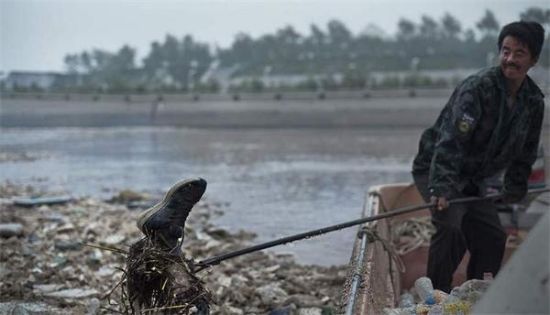Now In China's Rivers: Decomposing Humans


“Based on our overall measuring results in past years, water quality not only remained normal, but in some cases has even improved,” saidLi Lei, deputy environmental bureau chief of Lanzhou, last week.
The reassuring words, carried by a Hong Kong newspaper, were in response to a controversy triggered by Shanghai’s Oriental Morning Post, which last October reported that since the 1960s at least 10,000 human corpses were found in an 80-kilometer stretch of the Yellow River in and near Lanzhou, the capital of inland Gansu province.
On Thursday, Lanzhou authorities announced that about 100 bodies are retrieved from the Yellow River each year. That figure, however, is well wide of the mark. Just one “body fisher,” Wei Jinpeng, collects about 80 to 100 corpses each year from his spot 18 miles downriver from Lanzhou, and he is just one of many involved in this profitable, but gruesome, trade. The Shanghai paper also reported that in recent times there has been an annual increase of 200 to 300 corpses retrieved in and around Lanzhou.
The presence of decomposing humans in the waterway is not just limited to the area around the Gansu capital. Body fishers work most of the Yellow River, Asia’s second longest, from west of Lanzhou to Shandong province at its mouth.
Corpse-filled waterways in China are not exactly a new problem, yet they have attracted heightened attention in recent weeks because of the dumping of more than 16,000 pig carcasses—many of them disease-ridden—into the Huangpu River, which runs through the middle of Shanghai and provides more than a fifth of the city’s drinking water. Farmers also unloaded more than a thousand lifeless ducks into the Nan River in Sichuan province.
China’s great rivers are becoming morgues for humans, birds, and animals. Wei Jinpeng, the busy Lanzhou body fisher, keeps his inventory of dead people floating in a Yellow River cove facedown until customers buy the remains of their loved ones.
That practice slows decomposition, but it also further contaminates the river. Mr. Li, the Lanzhou environmental official, claims rotting corpses have not affected the water quality of the Yellow River, but his assertions do not ring true. “If these bodies are left untreated in the water to decompose, the ensuing impact of pollution is far more severe than that caused by the dumping of household waste,” states a 2005 report from Daxia Hydropower Company, referring to the Yellow River. An October 2012 article in the semi-official Global Times documents how river water, polluted by human remains and mixed with well water, is unsafe for drinking.
And it is not only the water in the Yellow River, which flows through nine provinces, that is at risk from contamination. Incredibly, bodies, prior to identification, are allowed to float in at least one reservoir in the Lanzhou area.
The Lanzhou government cremates some unclaimed remains and notes it already has procedures to deal with the situation. Yet the reality is that, for the most part, the city turns a blind eye and has done little since 2006, when it promised to crack down on body fishing.
Why the slow response? As Daxia’s 2005 report states, “procedures are complicated to properly dispose of these corpses, so many law enforcement departments are unwilling to get involved in the problem.”
How can law enforcement remain uninterested? The Global Times believes crime accounts for only 5% of the bodies. Lanzhou authorities downplay foul play even more. Huang Xiaoping, the city’s police spokesman, said accidents or suicides were to blame. Of the 417 corpses fished out between 2008 and last year, only two were the result of crimes, he said.
Those statistics fly in the face of circumstantial evidence. “Most of the bodies that are not claimed by relatives are female migrant workers who had moved to Lanzhou,” Wei Jinpeng told McClatchy Newspapers. “Most of them have been murdered.”
The authorities obviously cannot solve a problem they refuse to acknowledge. As a consequence, decomposing humans continue to plague Yellow River communities. Lanzhou officials, for instance, do not in fact stop body fishers from cutting loose unclaimed corpses and letting the current take them away, thereby contaminating downstream water.
In China, the zombies float, not walk.
No comments:
Post a Comment
Comments always welcome!